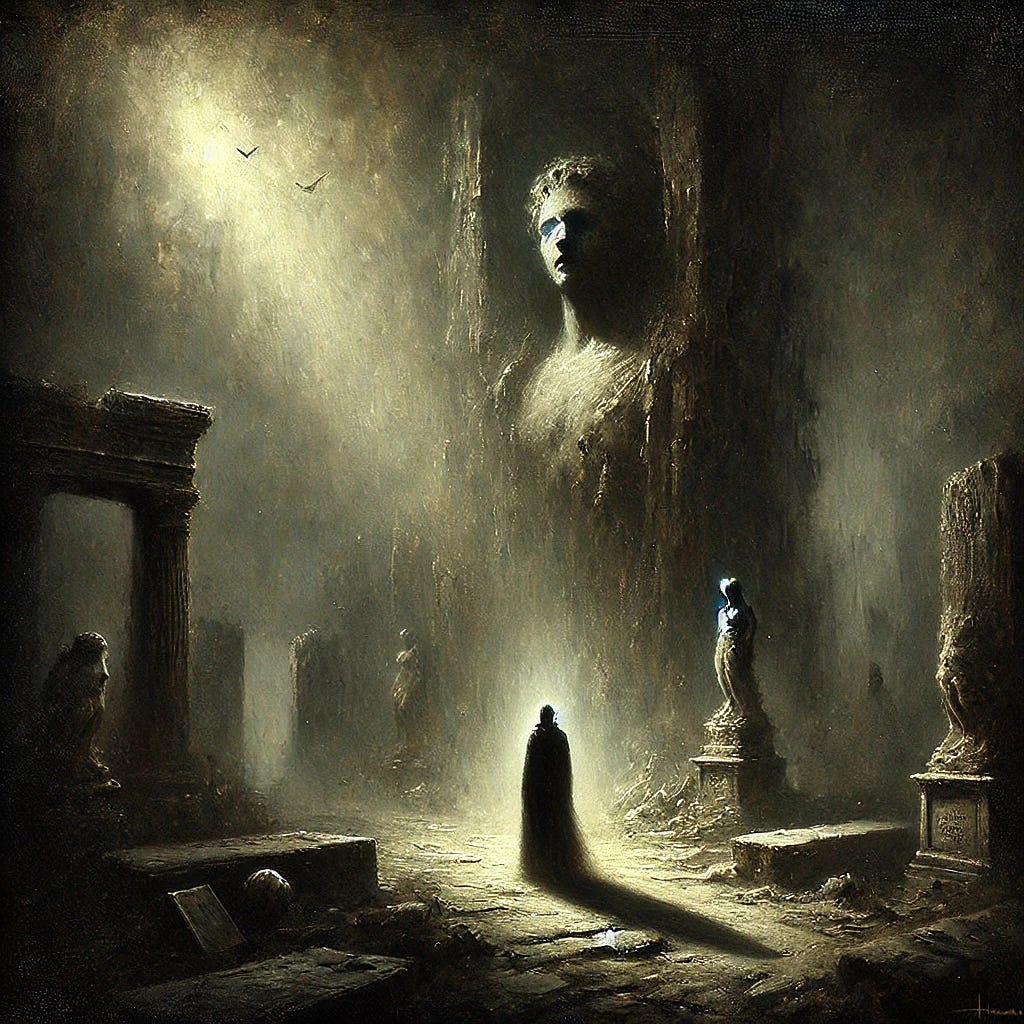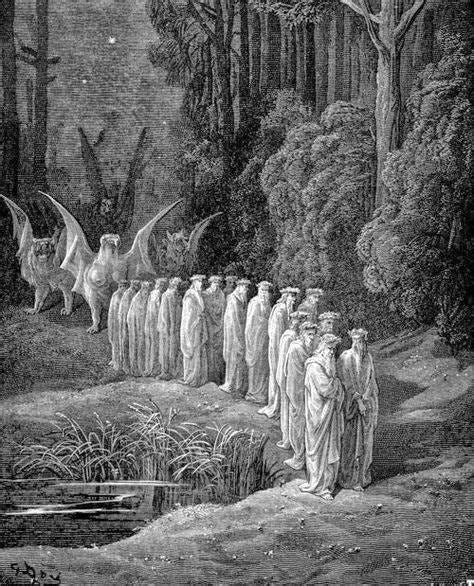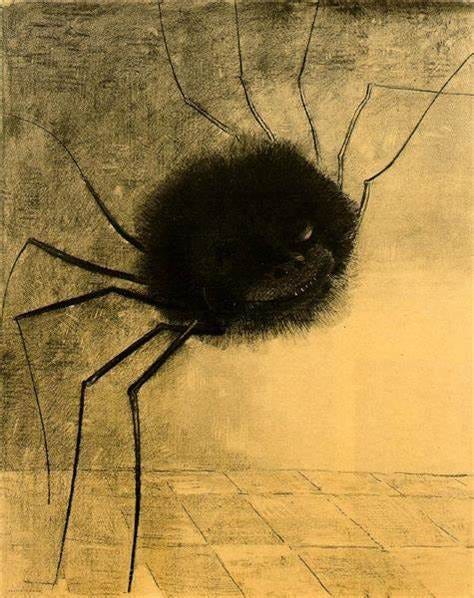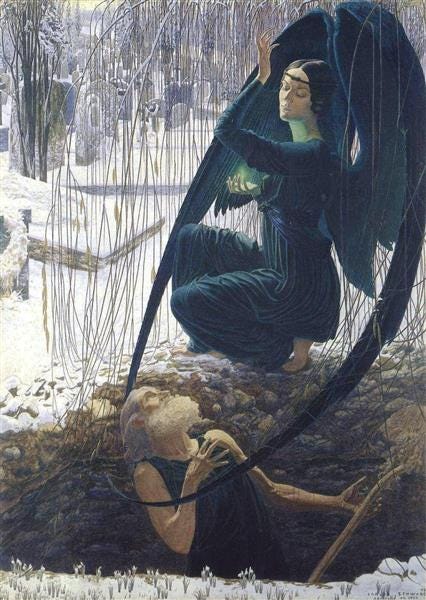On the False Gesture: How All Doing is Undoing
Being Over Becoming
[Long time since last post. Been sick. Better now. Putting on the unsubbed notification for this one to watch the good times role… Enjoy…]
Between the dream and the act—there is where the pigs of capital feast…
But I tell you: by definition, every act is a failure, because every act is an acting—an imitation of that perfection we believe to carry within ourselves.
It is, after all, in that dry and bright noon of the soul where most of us still dwell—where the perfect self waits: the dream-self, the desired-self, idealized almost beyond belief—yet remains so sadly unrealized when placed against the cold, blunt drizzle of reality.
The Dream-Self as Haunting
But why and how? Whence comes that self to which we all aspire?
It is in the act after the act—in the regret—the imagination, so hasty to follow all endeavors.
For we cannot act without reflection. Indeed, it is very tempting to believe that to reflect is not merely a human enterprise, but humanity itself: to challenge and undo ourselves is what makes us ourselves. I mean, in my desperate way, how we follow each act—those most pertinent, especially—with a reflection on the act’s success. Whether it is the simplest gesture to a friend or the vast undertaking of those desert years which make up so much of our lives, we cannot help but look back, wondering, asking, demanding:
What went wrong? What right? What could have gone better? Did I speak too quickly? Too earnestly? Too softly? Was I honest? Did I love well—or only pretend to? What really am I?
In such a meditative mood, we meet these thoughts with the sad specter of hindsight and, ultimately, with more brutality than honesty in the assessment of our capabilities, mark ourselves as inadequate—imagining how much better our lives would have been, how much better we, ourselves, might have been, had we lived up to the recommendations of our future selves.
With these acts of imagined correction, then, a new ideal is born—what we could have been, and eventually, what we believe we should have been.
Enter then the perfect self, the self who was always right, who made every decision with unerring accuracy—who worked hard, desired hard, loved hard; unbounded by reality—constructed of dreams—this self has the ideal life; indeed, it is the ideal self: smart, sophisticated, desired by all, all-accomplishing. Who cannot help but feel a pygmy when placed against such an overwhelming idol, the idol of our true self disincarnate?
But error is accumulative: each act is a debasement, a further “going away” from the ideal. Each moment, then, our perfection must bear witness to our folly, our fumblings among this unwieldy onrush of time. Each moment we let “ourselves” down… decidedly.
Here, then, in this cold conjunction of reality and dreams, we find a despair more desperate than Hamlet’s—more than something merely psychological, pathological, existential, or even Oedipal. Instead, it is an anguish that sprouts from our very definition of Being, the very act of Being itself. It is ontological. A poisoning of the universe. Existence becomes a stagnant metaphysical well from which we must imbibe—each moment a small sup of filth for which there is no alternative: we must bear the course, the bitter instant, dreadful though it is.
All becoming is toxic in this regard.
Life turns into a sickness.
We die by life, despairing under the ever-mocking spectator of whom we might have been.
The responses to this ontological anguish are varied—but all begin in that feeling that life is somehow disappointing, that reality is incomplete in its vividness—a grey, unfulfilled shadow of what it could have been: an overcast day in what was believed to be a brilliant summer. Always, among many, I have noticed there is the sense that some great promise has not been kept, that at our birth a vow was broken, that life was a mistake.
Under such a spell, some become ghosts, haunters of their own lives; an unmistakable spectral decay of the soul sets in: everything passes through them, everything, and they remain indifferent to any questions that might better materialize their being. You may know them by their unfeeling ignorance, their utter vapidity.
There are also the mourners, those who turn their lives into one long funeral, grieving their god—their unreachable self—puzzling away in the black waste of the night always as to what might have been, what will never be. For them, life is “just a getting through the day,” the existence of endurance, not enjoyment. Why care about life when one is already dead? At times they take an interest in politics or the news, but merely as an example of how the world reflects their own existence: incomplete, miserable, and unborn.
Then there are the grapplers: those who, hopeless of themselves, attach themselves to some idea. Through the sacrifice of their imperfect self, they hope to bring a level of completeness and perfection to some ideology. In their dogma’s final form—its all-conquering completeness, its all-encompassing being—they will share in it, their perfection achieved by proxy.
Finally, there are the nihilists. Weary of the imperfection implicit in every moment, they turn their backs utterly on life—seeking, in their paradoxical way, a negative perfection. In this, we might class all Buddhists and others who live by a shattering apophasis.
Failed Remedies
It was Kant who said that man is so constituted as to be condemned to raising metaphysical questions. But why? Well, because it shall always be the dream of man to make the larger, irremediable universe bow to the minor, to seek for some answer to our failed part in it. Man will always return to metaphysics because man will have himself again, and again, and forever, because the perfection he desires will not come. It cannot come.
Prior to this failed state of modernity, various realms of thought sought to dispel or discharge, or even disavow, this frightful circumstance of the never-whole: man’s imperfect state.
Cynics, those philosophic mongrels, sought refuge in nature. For all their talk of self-sufficiency and indifference to public opinion, it was in the simplicity of the dog that they found their haven. For truly, the dog’s lack of self-conscious expression was a model to behold: no bone has ever been nibbled on inadequately, nor any post pissed on in failed perfection! The dog knows no regret. How can perfection not be attained when perfection has been lowered to the basest life-form, or even forgotten entirely in the forgetting of that self-awareness which started the whole chase? If the dog is the humble model—how could one not fail? And yet—what dog ever aspired to be DOG? Is not the aspiration itself the ultimate negation?
Stoics, in a similar vein, attempt to temper any misplaced optimism we might have about life and ourselves: dog again! but this time tied to the cart of fate. There is that constant reminder that events are external to our control, and therefore, there cannot be any disappointment in our failure. One must adjust one’s expectations downward until the abyss becomes acceaeptable. But isn’t this just an abstraction, a one-stepped retreat? What is the Stoic god really but another complaint as to the imperfection of life and the maundering acceptation of such?
Religion—especially Christianity—is the deferral of that perfection, the lifetime resignation to the broken and failed beast that is man. God, it is said, accepts the imperfect in you—but in death He will scald the squalid dross from off your soul and materialize you at last in heaven, perfected, whole. It is this great promise that so attracts. One must only endure. One must only strive to be perfect—morally, obediently, groveling—and your perfection is assured. Not in life, naturally, but beyond it. There, and only there, the ideal self will be given to you—a reward for your humiliation and despair. Amen.
But now—empty, God-less, de-centered, the transcendent signified no more, earth shaken even as to ourselves—what now? Who can soften the gap between the farce and its model?
As I have mentioned above, there are those who attempt either a shirking of existence, a forgetting, or a despairing, but in the end, none can escape the ideal—perhaps our very last ideal?
For almost all, existence itself remains a kind of model; we believe it to be the most “positive” of states: that is, being in life, we cannot help but take the side of life. Sadly, this idea is as foundationless as all the rest, and it too seems to be coming to an end in the seemingly endless manifest hatred of humanity for itself. One only needs to look around to see----
Yet existence still hangs on by a thread; positivity has not yet totally been abandoned—except, of course, by the suicide. Here, capitalism plays its hand. Here, it feasts on the decaying remnant: the soul, hateful of itself but still sparkling faintly with existence—so hopeful—so naïve—perfect for the pig.
Feast then, you great swine, the being is all yours, no matter how much nihilism and despair you might find there; until man desires only his death, he will go on desiring himself and those who promise him himself.
From this pity at our unrealized selves, capitalism steps into the void with its sickly promises. It takes advantage of us. Like coffin companies that charge an exorbitant fee to the dead person’s relatives. It sells our misery back to us as promise: the promise of completeness, of perfection, so desired, so impossible. Every object is merely a pouring in of that negative space between the being and its ideal. We hope rather to drown ourselves with garbage and forget rather than live with the bitter truth: that there is none.
Thus, grieving always, willing to pay any price, work for any pitiless pitmaster to achieve nothing: Slaves.
Perfection as Servitude
Would our perfect self even recognize us? Would their spit scald as lava? How debased, how humiliated we would be if our paths were ever to meet.
But what does it even mean to be perfect? Surely, this is the better question to ask.
Imagine now some hunter from the Amazon—perfect, beyond reproach, a specimen of the highest order: non plus ultra, demi-god, fabled of the ancients, the unwieldy desire of all.
But now, remove him from those sweltering depths and drop him into the concrete tundra of New York, where flea-bitten rats dance with the bones of the dead. Suddenly, our savage-magnifico is no longer divine but absurd—a fool, a parody. Perfection disowns him. He shares more with the tramp than with the elite. His glory is displaced; his excellence has become error.
I will not go on.
As with all things, perfection is relative—wholly bound to history, context, culture. There is no absolute. There is only what is deemed perfect by the standards of the moment.
So then, the perfect self would be the ultimate slave—perfect in its slavery—for it would be perfectly adapted to the reality that oppresses it. Every act would be measured, correct, seamless—because every act would mirror what society expects. Who would truly want such a self?
No. I give it to you differently: in imperfection is where the real begins. In your tremors, your stammerings, your radical refusals—in the asymmetry of your being—you are truer than any idol of perfection.
We will never be rid of the perfect self; it haunts us. That is the burden of the gesture of becoming. All becoming is slavery in this regard—especially the guilt of not becoming who we believe we should.
We need being, rather.
The false gesture undoes us. But in that undoing—there, finally—something true begins.






I think accepting your flaws and learning to live with them is actually a sign of maturity. It takes strength to stop chasing some impossible version of yourself and just be okay with who you are.
But at the same time, I still believe it’s a good and worthy goal to try to better yourself. Not in a way that becomes obsessive or self-punishing, but with balance—working on being a better person while knowing full well that perfection will never come. That kind of effort can bring a quiet kind of satisfaction, even if not happiness.
Also, the philosophical ideas mentioned—like cynicism, stoicism, or even spirituality—can be helpful too, as long as they're used in moderation. They’re not solutions to everything, but they are still part of what it means to live an authentic human life.
Ah, the sense of horniness is back at play, chasing the superior veneration of the mirror of naught! Ouroboros it is, then.
The great conqueror of the abyss, you spin a good yarn; I concede you that.
How polished your reflections are! Come, let's walk on the waters of nothingness; they seem clear this time of year.
Grandiloquent rhetoric will gain you much excellence but never the joy of the fool.
A dog? No way; these lovely creatures are eternally loyal – huff huff.
I bid you much fortune, dear wanderer.
(one should love Mircea Eliade, don’t you think?)